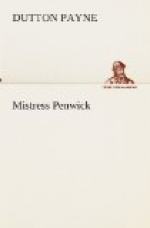“Nay, I could never guess, for I know not whom Adrian’s friends are; but if thy friend of the morning was the King, ’tis certain the setting sun brings thee one less titled.”
“’Tis so, but one who may be a King. Thou wilt never tell, Katherine?”
“Nay, never.”
“’Twas the King’s son, his Grace the Duke of Monmouth.”
“Ah, ah, a Prince! Thou art indeed favoured. And how came it about? I am very curious.” Lady Constance related part of her interview with the Duke, embellished and with many deviations—
“He said they were to be at the monastery as witnesses and intimated that the King had heard of thy wonderful beauty and grew so impatient to see thee he must either come himself or send some one he could trust. Monmouth said thy request was already granted in the King’s mind, and he only waited to see thee to give it utterance. Thou dost know what a good Catholic he is, and hearing they were to send thee to ask certain things of his clemency, he has sent the Duke with other special guard to render speed and safety to thy journey to Whitehall, where great honour will be shown Adrian’s fair bride.” Constance so entered into the very soul of her lies, she half believed them as she gave them utterance.
The young maid was well-nigh beside herself with pleasure at the honours that were to attend her, and she gave up all idea of a backward step. And when Constance proclaimed she was to accompany her, her heart leapt up with joy. She gave no place to doubt now, ’twas an unknown quantity, and her voice trembled as she said—“It makes me perfectly content, if thou art to accompany me. Thou wilt go with me to the monastery, Constance?” For once her ladyship answered truthfully, but she did not know it:
“Nay, I am to join thee some time after twelve; I know not just when or where; but we are to be together. I owe this especial favour to the Duke. I am so glad thou art espoused, or will be in a short while, or I should be insanely jealous. Look, Katherine!” and Constance under cover of her handkerchief showed the ring.
“Isn’t it beautiful?” said Katherine.
Mistress Penwick, like many another of her beauty and age, was inclined to be of ill-spirit when another of her sex seemed to be in favour; and at Constance’ sudden acquaintance with the King’s son, and able to wear his ring, she was piqued, and almost wished it was herself instead; for in such intimacy there could be nothing else but a very near and exalted position at Court. The poor child—innocent of all evil seeing naught in the gaining of Royal favour but the achievement of all that was high, holy, beautiful and perfect—now for a brief moment scorned her own poor estate and fell to envying Constance, and was of a notion not to go at all to the monastery;—but if she didn’t, then her religion would suffer; for who could go to the King in her place? She knew she was beautiful, and knew its influence, and was sure the King would not refuse her. Now if Lord Cedric had not forbidden her going to the monastery for confession, she could have known what they wished and gone openly with Lady Constance or Sir Julian, or perhaps just with Janet to his Majesty and gained his favour and at once have become a Lady of Honour. But no, ’twas not thus, and things were as they were, and she could not change them or retrace.




